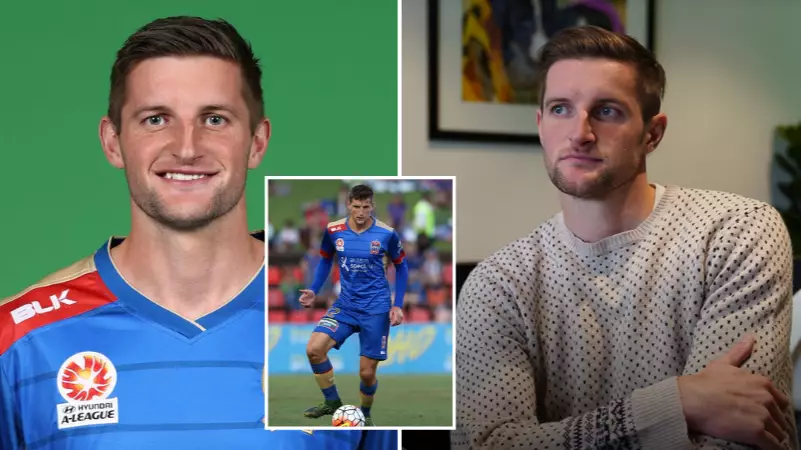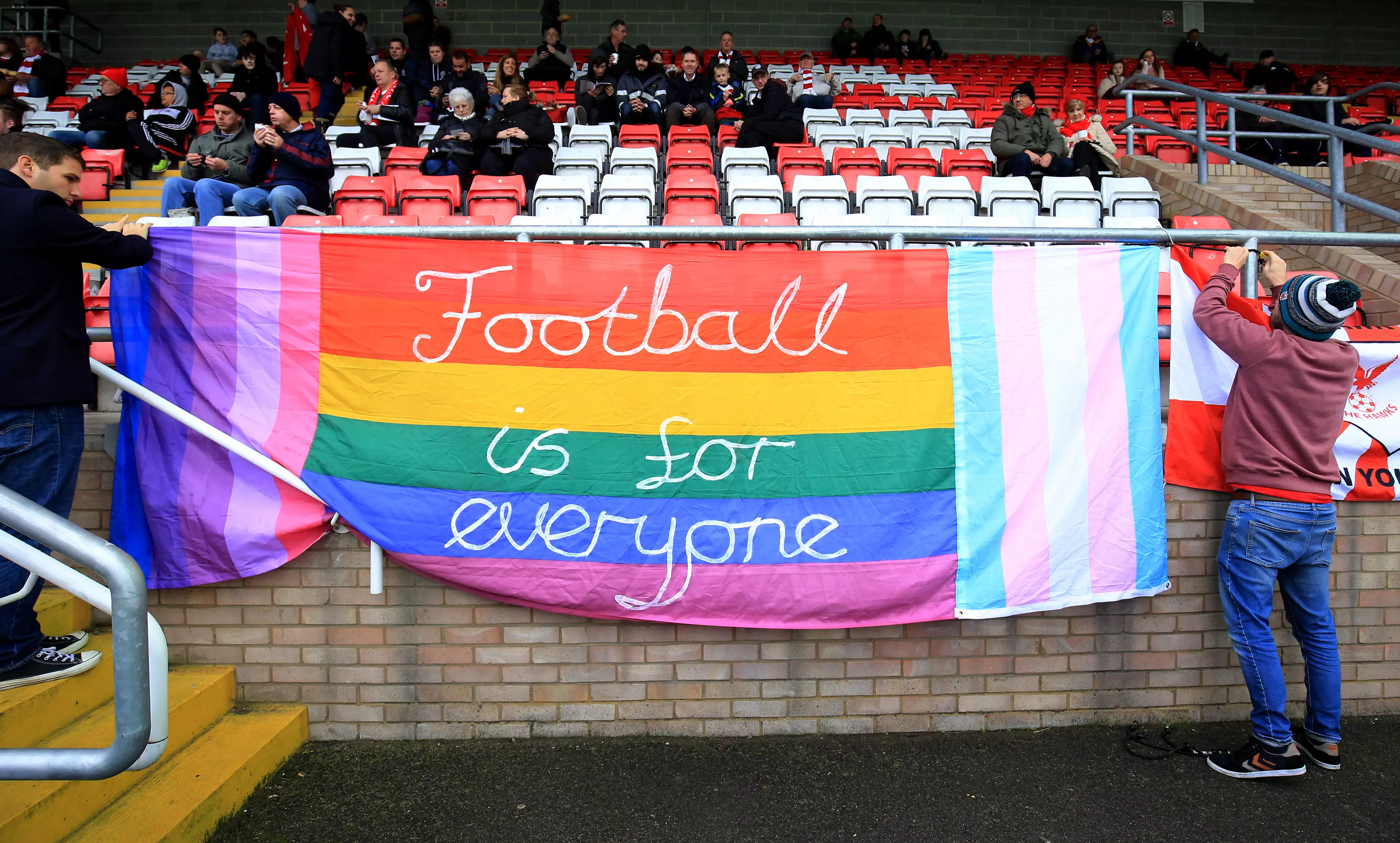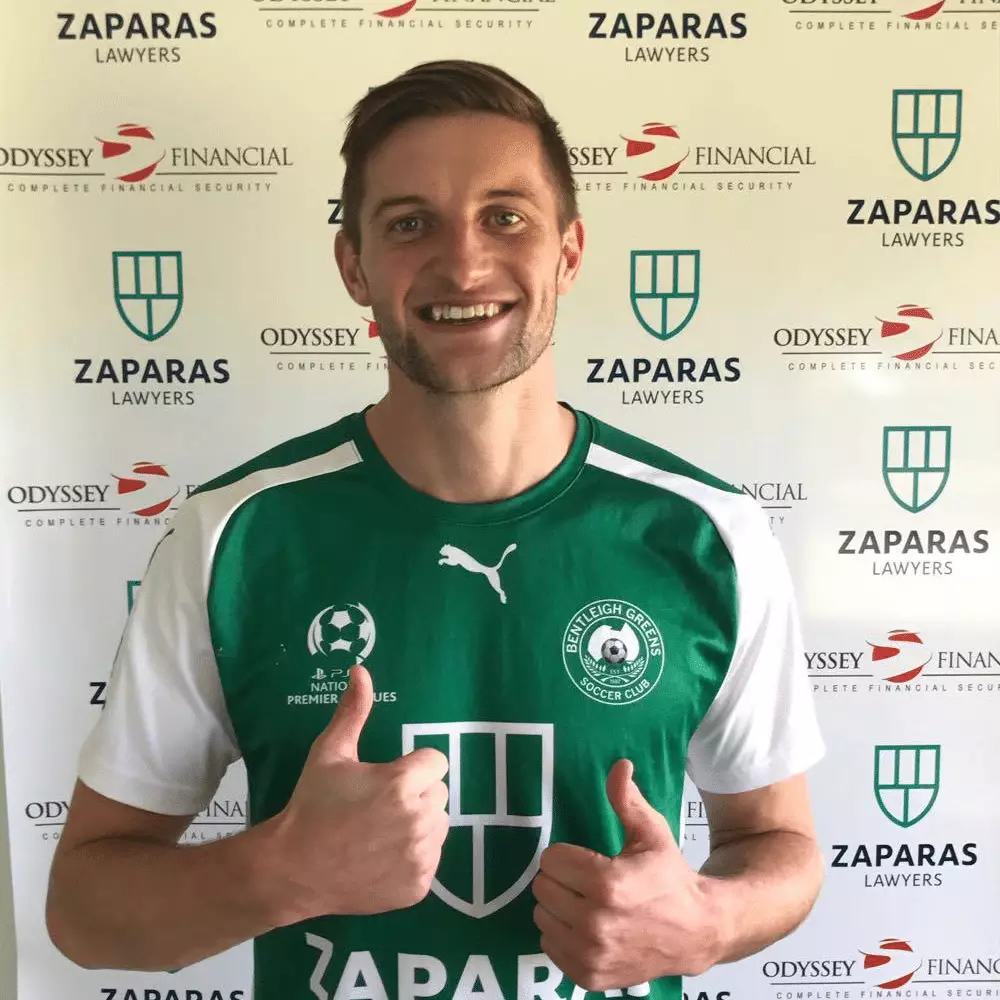
How will people react? Am I going to get abuse from fans? Are players not going to accept me? Will I have to move to another club? These are just some of the questions going through Andy Brennan's head as he prepares to make one of the biggest decisions of his life.
"It's taken me years to get comfortable saying this - I'm gay."
On May 14, 2019, in an Instagram post to his thousands of followers, Andy Brennan made history when he became the first male Australian footballer to publicly come out. "It got to the point where I was sick of holding it in and I was fighting it internally," he told SPORTbible.
It didn't just turn out to be the biggest decision of his life. But rather the best decision.
From a personal aspect, Brennan has been through a lot in his 10-year football career. Now, he has opened up about his journey like never before. A weight was lifted from his shoulders when he decided to tell the world and he knows how important that moment was.
Ultimately, he wants others to feel comfortable doing the same.
The silence is deafening. Why is being a gay and a professional footballer still a taboo subject in 2021? It's something rarely spoken about in public. In fact, there are only a handful of professionals who have come out as gay throughout history.
Only last year, an unnamed Premier League footballer, who has known since aged 14 that he was gay, said he is "too scared" to publicly come out because he feels that football has not "moved on" compared to the rest of society.
"Even though society has moved on massively since I was a teenager, the game simply hasn't," he said in an open letter via the Justin Fashanu Foundation. "Those running it need to put more measures in place so gay players know they will get the support they need. The powers-that-be are only playing lip service to the issue."
Back in 2014, former Aston Villa and West Ham midfielder Thomas Hitzlsperger, who came out publicly after retirement, said that he thought it would be a long time before there was an openly gay player in the Premier League.
Seven years on and there are no professional footballers in the English and Scottish leagues who have done so. Why is that?
"I definitely think it's about education and people saying things without realising how much of an impact it has on gay people," Brennan tells us. "It feels like there's a deep-rooted thought that you can't play football and be gay. I'm living proof that you can and people do accept it.
"It's so hard to put your finger on why people wouldn't do it [come out]. But the fear is so real. The fear that you won't get equal opportunities after putting so much time and effort into making it and to suddenly have that all put in jeopardy is a scary thing.
"If that person does come out, they are going to get so much publicity out of it. I certainly didn't want that when I came out as gay. I didn't want to do public speaking or anything like that, but then it got to the point where I realised how important this is.
"I was getting messages from 16-year-old kids in Australia, who had grown up in the same kind of environment as me. I thought, 'How the hell is this going to change if nobody speaks about it and pushes the subject while getting people to talk about it?'
"It makes sense that people would be so apprehensive about it. But hopefully with more education and more people talking about it, people can open up.
"Statistically speaking, there's got to be people playing in the Premier League and Championship that are gay, but unfortunately those people will wait until they stop playing to come out. Even if it's just one person who plays at such a high level and does come out - that might spark others to do the same and say, 'It's ridiculous that I'm holding this in.'
"Hopefully someone finds the courage to do it because it would be huge."

Brennan understands the magnitude of coming out publicly. He was terrified of the reaction from fans, teammates and even his close friends for years; so held back his true self.
But when he did speak out, a weight was lifted from his shoulders.
"I was carrying those insecurities, so to get rid of that was a huge relief," he says. "I remember at first, I just told people I was bisexual because I felt like that would be easier to say but later I opened up and said I was gay. That took a long time to do.
"Every person you spoke to, whether it was your friend or a teammate, or even a coach; I had that same kind of fear going into a conversation. Especially because if it's a friendship, you just don't how they are going to respond. That fear is scary.
"If they're your friends and you enjoy spending time with them and suddenly, they might reject you or even stop spending time with you. It's daunting.
"Those fears were the same in football. I've spent my whole life playing the game and I obviously love it but I kept thinking, 'Does this mean I'm going to have to stop playing? Am I going to get abuse from fans? Are the players not going to accept me?'
"Obviously in the changing room, you're getting dressed and getting ready, training four times a week. It would play on my mind. Now it doesn't bother me but getting to that point was a relief because it was such a burden. I was constantly thinking about it.
"All those thoughts and feelings got into my head and lots of scenarios play out, so when you finally talk about it and see people actually don't care and just want to play; that's the most important thing."
The Hobart-born forward, who spent two years playing in the Australian A-League with Newcastle Jets, received an incredible response not just from those close to him, but people around the world when he decided to come out.
He was initially wary of the response but after his manager and teammates at NPL Victoria League side Green Gully were "so good" about the news and supported Andy throughout, he realised everyone was on the same wavelength.
"I was more worried about the more minor things; whether people would act different or shy away from me while they were getting dressed in the changing room," says Brennan.
"I didn't care - and it wasn't as if I was hitting on people or looking at them when i went in the room. For me it is, and has always been, about football. I want to go out and play, train and win. That didn't change. For them to have the same reaction and not care about the personal stuff was brilliant."
His post on Instagram received an overwhelming amount of support. In total, almost 1,000 people commented on his decision, with the majority being positive.
There can, of course, be negative responses and even outright homophobia. But Andy has his own way of dealing with it.
"There's definitely the odd comment on Instagram and Twitter and, as much as they are bad, they just point out to other people what it's actually like and why it's so important these things are spoken about," says Brennan.
"It's obviously not great but I don't mind as I take it with a pinch of salt. The positives far outweigh the negatives for me. When I came out, so many people in Australian football reached out and said good on you.
"Someone like Archie Thompson, who was a top player in Australia in his day, for example. He posted my story on social media and hit a new audience that probably wouldn't have seen it before. That's huge. It's those kind of things that normalises it more.
"I'm definitely much more comfortable talking about it. But you still find people who are apprehensive or don't want to ask questions, or might be worried about asking me something that might make me feel uncomfortable. There's still that 'eggshell' feeling around it.
"It shouldn't be like that. It doesn't need to be."
Andy also thinks his performances on the pitch have improved as a result. His mental health is better than ever and he feels far more comfortable in his own skin. "I get so much more enjoyment out of football than before," he says.
"I think as a player, I've eventually become much more confident. If players had a go at you or got stuck in, I took it personally at first. It was always something that was hard to deal with but I carry myself differently now. I can brush it off and it doesn't feel personal.
"That stemmed from confidence. I wasn't affected by the little things than you were previously.
"It definitely plays its role on your mental health as well. I didn't really realise it until after coming out as gay but, I was no longer having those fears and thoughts of rejection and what might occur - now I don't even think about it anymore, which is a crazy thought because for so long, I was so used to thinking about it."

It's clear that a stigma around being gay in sport still exists, especially in certain parts of the world, although the signs of that changing in football is clear.
A YouGov survey spoke to 1,010 heterosexual football fans across the United Kingdom and it revealed that almost half of the participants said they would like to see more LGBTQ people across all levels of the game - including players, managers and coaching staff.
In addition, 80% of fans said they would be uncomfortable hearing homophobic abuse at a match.
Brennan, who has noticed a shift in Australia when it comes to the stigma, is keen for people to reflect on the type of language they use to encourage others to feel comfortable about their sexuality.
"I do think there is still a stigma around being gay," he says.
"It actually made me reflect on what it was like when I was growing up; words like 'that's so gay' and people calling each other 'faggots' or 'you fag' - that was just normal. People said it all the time but didn't realise or understand what they were talking about.
"I internalised it as being wrong to be gay. Someone does something stupid or soft and you get called 'gay'. Well, you can't be gay and play football. It was that stereotype. People don't like that. That itself builds it.
"Whether the stigma is there and people believe it, I don't know, but it leads on to the importance of education and how important it is to be vocal about the subject.
"This is why I think this is so important. I hope it reaches people and it shows that speaking about being gay with those words actually harms those people who are gay and are worried or fearful about what's going to happen to them if they do come out."
Statistically speaking, there will be many more footballers who are gay but have yet to come out publicly; so what would Andy say to someone who was going through the same situation he did?
"People ask this a lot," he says. "It's so hard to know what people's environments are and who they have around them. Something I think that everyone has is someone who is really close that they can confide in. That for me was the biggest moment, when I could tell someone else how I was feeling.
"When it got to that point, and I saw their reaction and how happy they were, I spoke about it and asked questions. It provoked me to speak more openly. It got to the point where I was so happy that they were interested that it made me lead on to speaking to others.
"That relief - and no longer carrying that burden on my shoulders - was so nice. Just keep speaking about it. That's the biggest thing I'd tell someone. If you find someone to speak to, and share that burden - or at least speak about it to someone for some comfort and advice - that's the first and most important step."
Featured Image Credit: PFA/A-LeagueTopics: Spotlight, Football, Andy Brennan, A-League, LGBT